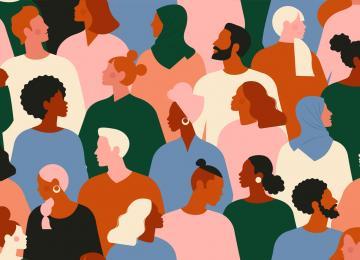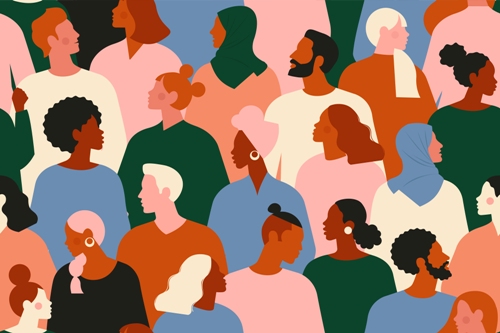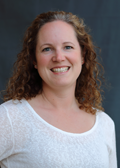
Regulators share their thoughts on the how to overcome ‘diversity fatigue,’ and what keeps them motivated to continue pursuing equity, diversity, and inclusion initiatives in the engineering profession.

This is the third article in a three-part series on equity, diversity, and inclusion in the engineering profession. Read part 1 and part 2.
 Equity, diversity, and inclusion (EDI) work is and has always been challenging because it invites us to self-reflect as individuals, and as organizations. It requires the exploration and acknowledgement of inequities and overcoming the defensiveness that comes from conversations on power and privilege.
Equity, diversity, and inclusion (EDI) work is and has always been challenging because it invites us to self-reflect as individuals, and as organizations. It requires the exploration and acknowledgement of inequities and overcoming the defensiveness that comes from conversations on power and privilege.
While such conversations and reflection can be challenging, they are also important if change is to succeed. But those who work in the area of EDI report hearing about 'diversity fatigue,' or people expressing frustration with the continual conversations on diversity and inclusion. Some who work on EDI initiatives may also express frustration at the apparent slow pace of change when it comes to the systemic, societal, and cultural changes that they are working towards.
In light of the recent Black Lives Matter protests that have taken place around the world and the focus these have placed on diversity and inclusion topics, Engineers Canada reached out to our colleagues at the Canadian engineering regulators who are working on improving EDI in the profession. In this final article of a three-part series, they discuss what keeps them motivated to continue pursuing EDI in the engineering profession.
Engineers Canada: Change can take time, especially when we’re working towards meaningful societal, cultural, and systemic change in the realm of EDI. Progress may be slow. What keeps you motivated to continue this work?
 Lisa Stepnuk, Engineers Geoscientists Manitoba: The engineers, interns and students for whom this work isn’t an option but an imposed daily reality. I experienced some of this as a student and an intern, myself. I have met students with such excitement about the technological advancements they want to be a part of, who want to serve their communities. I want to see them be fully valued, supported and actualized. I want to witness and experience the benefits of their work and values. What solutions will come from those doing the most care work and land defense? What innovations will come from those whose safety has been the least valued? What will it mean to expand and alter our design parameters? These are not limiting questions. They are exciting questions.
Lisa Stepnuk, Engineers Geoscientists Manitoba: The engineers, interns and students for whom this work isn’t an option but an imposed daily reality. I experienced some of this as a student and an intern, myself. I have met students with such excitement about the technological advancements they want to be a part of, who want to serve their communities. I want to see them be fully valued, supported and actualized. I want to witness and experience the benefits of their work and values. What solutions will come from those doing the most care work and land defense? What innovations will come from those whose safety has been the least valued? What will it mean to expand and alter our design parameters? These are not limiting questions. They are exciting questions.
 Laura Douglass, APEGNB: One of the things that I am passionate about is helping people see their potential through creative ideas. When I think about the people who have had their potential limited by systems that discriminate against them based on their gender identity or cultural background, it makes me angry. I do my best to fuel that anger into strategic action. There’s so much untapped potential right now that the engineering industry can benefit from, for the good of society as a whole.
Laura Douglass, APEGNB: One of the things that I am passionate about is helping people see their potential through creative ideas. When I think about the people who have had their potential limited by systems that discriminate against them based on their gender identity or cultural background, it makes me angry. I do my best to fuel that anger into strategic action. There’s so much untapped potential right now that the engineering industry can benefit from, for the good of society as a whole.
 Marcie Cochrane, Engineers and Geoscientists BC: Our motivation is driven by a desire to improve the profession for others: those in the profession, those entering, and future generations. Although we still have work to do to improve EDI within engineering, we have seen progress and continuing this work is important; working towards a future where there is equity and inclusion within the profession and diversity that reflects that of the general public that we serve. Engineering is a career path that can be rewarding and engaging, and we want to help remove barriers, working towards an inclusive profession and culture.
Marcie Cochrane, Engineers and Geoscientists BC: Our motivation is driven by a desire to improve the profession for others: those in the profession, those entering, and future generations. Although we still have work to do to improve EDI within engineering, we have seen progress and continuing this work is important; working towards a future where there is equity and inclusion within the profession and diversity that reflects that of the general public that we serve. Engineering is a career path that can be rewarding and engaging, and we want to help remove barriers, working towards an inclusive profession and culture.
Engineers Canada: What tips do you have for people who feel overwhelmed by the news and the ongoing information and conversations about diversity and inclusion?
 Mohamed El Daly, APEGA: We would try to have a conversation with them to better understand why they were feeling overwhelmed by EDI. Did it relate to a misunderstanding? The recent disturbing events and subsequent BLM movement? Did they perceive a personal loss as a result of D&I? Were they overwhelmed because they felt helpless? Depending on their response—we would provide education, information, actionable steps that they could take. We would try to share our own passion and enthusiasm for EDI with those who were feeling burnout or questioning the need for EDI initiatives.
Mohamed El Daly, APEGA: We would try to have a conversation with them to better understand why they were feeling overwhelmed by EDI. Did it relate to a misunderstanding? The recent disturbing events and subsequent BLM movement? Did they perceive a personal loss as a result of D&I? Were they overwhelmed because they felt helpless? Depending on their response—we would provide education, information, actionable steps that they could take. We would try to share our own passion and enthusiasm for EDI with those who were feeling burnout or questioning the need for EDI initiatives.
Lisa Stepnuk, Engineers Geoscientists Manitoba: People who express being overwhelmed or tired of hearing about EDI are often those of us holding privilege and access to power. It is extremely uncomfortable work to look within oneself or one’s organization and really examine our complicity in these systems. As Black author Ijeoma Oluo says: “The beauty of anti-racism is that you don't have to pretend to be free of racism to be an anti-racist. Anti-racism is the commitment to fight racism wherever you find it, including in yourself. And it's the only way forward.” This applies to all systems of dominance. We have real power and opportunity to listen, learn, and make things right in every moment of every day. What a position to be in. When people speak up, speak out, and ask us to consider our beliefs, words, and actions and non-actions, they are making a courageous move. It comes at a cost. It almost always requires much energy, deliberation, and risk. We must see it as a gift and be grateful. The burning means it’s working. We must dig deep. We aren’t nearly as tired and overwhelmed by it as they are.
Laura Douglass, APEGNB: You aren’t going to learn it all in one day. Create a personal action plan for yourself, and find someone to stay accountable with. Rather than reading all of the news from all of the sources, pick one news source that you trust and follow them for updates. This will allow you to focus on one thing at a time. It’s important to note that your news source doesn’t have to be traditional media. In the recent Black Lives Matter protests, social media like Instagram had more up-to-date and complete information than some of the traditional media sources. Again, it’s all about finding someone that you trust to share factual information with you. Last but not least, normalize changing your opinion after being presented with new information. This is the only way forward. Good luck.
 Kathy Baig, OIQ: I believe that the public would be less tired of hearing about it if we emphasized the positive achievements and showed the success stories. That is what we are doing at the OIQ, where we feature portraits of women and internationally trained professionals who stand out in their respective fields in each issue of our Plan magazine. This not only makes the engineering profession more attractive, but also encourages businesses to hire more women and immigrant workers. Little by little, we will succeed in creating a culture of inclusion across Quebec.
Kathy Baig, OIQ: I believe that the public would be less tired of hearing about it if we emphasized the positive achievements and showed the success stories. That is what we are doing at the OIQ, where we feature portraits of women and internationally trained professionals who stand out in their respective fields in each issue of our Plan magazine. This not only makes the engineering profession more attractive, but also encourages businesses to hire more women and immigrant workers. Little by little, we will succeed in creating a culture of inclusion across Quebec.
Marcie Cochrane, Engineers and Geoscientists BC: Many of us want to express our support, be vocal allies, and do our part to advance an equitable society. However, figuring out how to do this can be overwhelming and it can be difficult to figure out what steps can be taken.
We believe that more important than making statements about support for EDI is the need to take clear action that provides meaningful support. As an individual, this can start with education—reading books, watching documentaries on relevant topics, or pursuing training in implicit bias. Organizations can take a similar approach, providing training sessions and considering other actions such as book clubs. These first steps can ignite conversations to explore what else can be done and what steps can be taken, breaking things down into measurable, concrete actions. When talking about equity, diversity, and inclusion the change needed is a cultural change, and that will take time and sustained effort.


